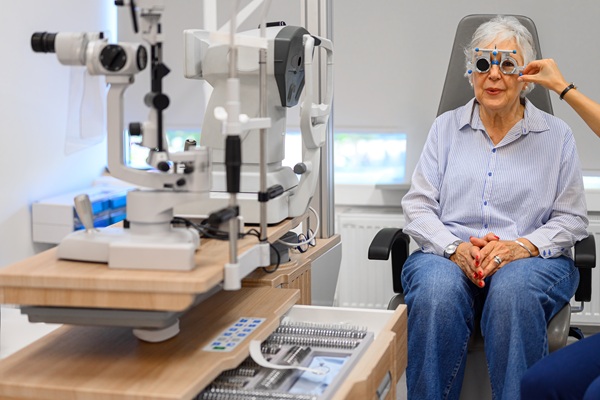What Is an Ophthalmologist?

An ophthalmologist is one of several types of professionals who have a specific role to play in the field of vision health. Along with optometrists and opticians, an ophthalmologist can make up a part of a comprehensive eye care team. The similar-sounding names of these three types of providers can cause confusion among patients. However, each has training and skills specific to the tasks they have to perform. Knowing the differences can help patients seek out the specific professional best suited to address their needs.
Difference between an ophthalmologist and other eye care professionals
Opticians, optometrists and ophthalmologists each have different tasks to perform within the field of eye care:
- Opticians: Fill prescriptions for glasses and contact lenses, making adjustments and repairs as needed
- Optometrists: Perform vision tests and eye exams, and prescribe corrective lenses to treat certain eye conditions
- Ophthalmologists: Diagnose and treat diseases of the eye while providing vision services similar to what an optometrist does
Differences between an ophthalmologist and an optometrist
The main difference between an optometrist and an ophthalmologist is that the latter is a medical doctor. Optometrists hold a four-year Doctor of Optometry degree, which allows them to provide primary vision health care in the form of vision tests, eye exams and prescriptions for corrective lenses. While performing screening tests as part of a routine eye exam, an optometrist may detect signs of an eye disease, such as glaucoma, diabetic retinopathy or cataracts. However, an optometrist is unable to treat such a disease and will therefore likely refer the patient to an ophthalmologist.
As a medical doctor, an ophthalmologist has received approximately three times the education and training that an optometrist has, having completed a degree program that lasts approximately 12 to 13 years. A doctor of ophthalmology can perform all the same services that an optometrist can but can also do much more besides. In addition to merely diagnosing disorders of the eye, an ophthalmologist can provide treatment as well. Sometimes this includes performing surgery to remove cataracts, correct vision or raise eyelids that have become droopy with age.
Specialization within the ophthalmology field
Ophthalmology is already a specialized field of medicine, sometimes entailing a one- to two-year fellowship in addition to the combined eight years of undergraduate studies and medical school, plus the three-year residency, required to obtain an MD degree. The fellowship provides in-depth training in a subspecialty within the field of ophthalmology. With a subspecialty, an ophthalmologist can provide care in the particular area that is of greatest professional interest. Examples of subspecialties include pediatric ophthalmology, oculoplastic surgery and diseases specifically affecting the cornea or retina.
Conclusion
The human eye is one of the most complicated structures in the body. While some can receive sufficient care from an optometrist and may never require a doctor of ophthalmology, many patients require the services of a comprehensive eye care team that includes an ophthalmologist, an optician and an optometrist to diagnose and treat whatever specific eye health issues that may arise.
Request an appointment here: https://brighteyesny.com or call Bright Eyes Optometry at (914) 730-9574 for an appointment in our New Rochelle office.
Check out what others are saying about our services on Yelp: Ophthalmologist in New Rochelle, NY.
Recent Posts
An ophthalmologist visit becomes important when eye symptoms go beyond routine vision changes and signal disease, injury, or sudden shifts that need medical or surgical eye care. An ophthalmologist is a physician who diagnoses and treats eye conditions and performs eye surgery when needed.Many people search "optometrist" when they mean ophthalmologist, and the term often…
Cataract treatment can help you regain clearer vision and improved daily functioning. Professional care from an experienced optometrist offers benefits that can improve your long-term eye health and overall quality of life. The following guide outlines the three major benefits of cataract treatment provided by a trusted, experienced optometrist.During regular appointments with an optometrist, they…
Prescription glasses are an important part of clear vision and eye health. However, if you break or damage your glasses, it is important to act quickly to avoid further problems and restore your sight. Fortunately, taking care of damaged prescription glasses as soon as possible can save you time, money, and discomfort.The first step after…
Dry eye may start with mild irritation, but over time, it can begin to interfere with focus, comfort, and even quality of life. An optometrist can help when this condition becomes more than just a temporary annoyance. There are many potential causes of dry eye, including hormonal changes and seasonal allergies. With tools that reveal…


